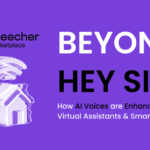Have you ever felt like you had too many hands to juggle? Or maybe you’ve wished you could have a personal assistant who would never tire of your requests? Well, the future is here, and it’s called voice AI. It’s not just a futuristic concept anymore; it’s a technology that’s becoming increasingly integrated into our daily lives.
From smart speakers that can order pizza to virtual assistants that can schedule meetings, voice AI is revolutionizing the way we interact with technology. But is it all sunshine and rainbows? Or are there hidden dangers lurking beneath the surface? Let’s dive in and explore the exciting world of voice AI.
My Proven Way to Make $100-$200 Per Day With 0 Investment – Watch THIS FREE Video to START >>

Consumer Applications
Smart Home Devices
Voice AI has transformed the way we interact with our homes. Smart speakers, like the Amazon Echo and Google Nest, have become ubiquitous in living rooms, bedrooms, and kitchens. These devices use voice recognition technology to understand and respond to your commands.
For example, you can ask your smart speaker to play music, set alarms, check the weather, or control smart home devices. By integrating with thermostats, lighting systems, and other appliances, voice AI allows you to create a personalized and convenient home environment.
Virtual Assistants
Virtual assistants, such as Siri, Google Assistant, and Alexa, are AI-powered software applications that can perform a wide range of tasks. They can set reminders, answer questions, send messages, and even make calls.
While these assistants have become increasingly capable, they still have limitations. They may struggle to understand complex queries or accents, and they can sometimes provide inaccurate or irrelevant information. However, as voice AI technology continues to advance, we can expect virtual assistants to become even more intelligent and helpful.
Voice Search
The rise of voice AI has also had a significant impact on search engine optimization (SEO). People are increasingly using their voices to search for information, which means that websites must be optimized for voice search queries. This requires understanding how people speak naturally and incorporating long-tail keywords into content.
Voice search has also led to a shift in user behavior. People are more likely to ask questions and seek conversational answers rather than simply typing in keywords. This means that websites must provide comprehensive and informative content that addresses user intent.

Check The Here To Buy Vocal Clone AI
Business and Industry Applications
Customer Service
Voice AI has revolutionized the way businesses interact with their customers. Chatbots and virtual agents powered by voice AI technology can handle a wide range of customer inquiries, from simple questions to complex problems.
These AI-powered assistants can provide 24/7 support, reducing customer wait times and improving overall satisfaction. They can also gather data on customer interactions, which can be used to identify trends and improve customer service processes.
Healthcare
Voice AI is also making a significant impact on the healthcare industry. One of the most promising applications is medical transcription. By using voice recognition technology, doctors can dictate their notes and reports, saving time and reducing errors.
Voice AI can also be used for patient diagnosis. AI-powered systems can analyze patient data, such as medical history and symptoms, to identify potential health conditions. This can help doctors make more accurate and timely diagnoses.
Education
Voice AI has the potential to personalize learning experiences and make education more accessible. For example, AI-powered tutors can provide one-on-one instruction, adapting to the needs of each student.
Voice AI can also be used for language tutoring. By analyzing a student’s speech patterns, AI-powered tutors can identify areas for improvement and provide targeted feedback. This can help students learn languages more effectively and efficiently.
My Proven Way to Make $100-$200 Per Day With 0 Investment – Watch THIS FREE Video to START >>
Accessibility and Inclusivity
Benefits for People with Disabilities
Voice AI has the potential to significantly improve accessibility for individuals with visual or hearing impairments. For example, screen readers can use voice output to read text aloud, allowing visually impaired users to access digital content.
Similarly, speech-to-text technology can enable individuals with hearing impairments to communicate more effectively. By converting spoken language into text, this technology can help to bridge communication gaps and promote inclusion.
Language Barriers
Voice AI can also help to break down language barriers and facilitate communication between people from different cultural backgrounds. Translation apps and devices powered by voice AI can translate spoken language in real time, making it easier for people to understand and be understood.
This technology can be particularly useful for travelers, business professionals, and anyone who needs to communicate with people from different linguistic backgrounds.
Social Implications
While voice AI offers many benefits, it also raises important social implications. One of the primary concerns is privacy. As voice AI devices become more prevalent, there are growing concerns about the collection and use of personal data.
Another issue is bias. AI algorithms can be biased if they are trained on data that is not representative of the broader population. This can lead to discriminatory outcomes, such as biased search results or unfair decision-making.
It is essential to address these concerns and ensure that voice AI is developed and deployed in a responsible and ethical manner.
Future Trends and Challenges
Emerging Technologies
Voice AI is a rapidly evolving field, with new technologies emerging all the time. One of the most promising trends is multimodal AI, which combines voice recognition with other modalities such as vision and touch. This allows AI systems to better understand and respond to complex inputs, making them more versatile and effective.
Another exciting development is the integration of emotional intelligence into voice AI. By analyzing tone of voice, pitch, and other vocal cues, AI systems can begin to understand and respond to human emotions. This has the potential to create more empathetic and engaging interactions.
Ethical Considerations
As voice AI becomes more sophisticated, it raises important ethical concerns. One of the primary concerns is privacy. Voice AI devices collect and store vast amounts of personal data, which can be vulnerable to hacking or misuse.
Another ethical challenge is the potential for bias in AI algorithms. If AI systems are trained on biased data, they can perpetuate harmful stereotypes and discrimination. It is essential to ensure that voice AI is developed and deployed in a way that is fair and equitable.
Future Outlook
Despite the challenges, the future of voice AI looks bright. As the technology continues to advance, we can expect to see even more innovative and useful applications. Voice AI has the potential to improve our lives in countless ways, from enhancing accessibility to improving customer service.
By addressing the ethical concerns and ensuring responsible development, we can harness the power of voice AI to create a better future for all.
My Proven Way to Make $100-$200 Per Day With 0 Investment – Watch THIS FREE Video to START >>
Conclusion
Voice AI is no longer a futuristic concept; it’s a technology that’s deeply integrated into our daily lives. From smart homes to healthcare, voice AI is transforming the way we interact with the world around us.
While there are challenges to address, such as privacy concerns and potential bias, the future of voice AI looks promising. By developing and deploying this technology responsibly, we can unlock its full potential and create a more inclusive and convenient world for everyone.









